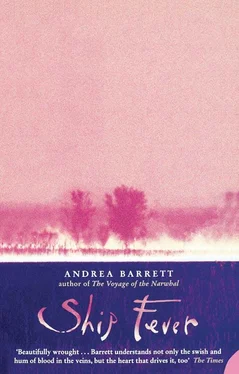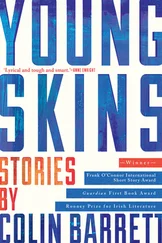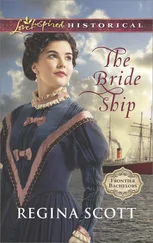But now this woman was too sick to read it, and there might be something in the closely written pages that would bring her husband sorrow. Quickly Nora made a decision; she reached into her satchel and took out the small parcel containing Lauchlin’s good shirt and waistcoat, and his watchchain and his watch. She pushed the journal down deeper and then held out her gift.
“It’s so little,” she said. “But I know he would have wanted you to have it.”
Arthur Adam unfolded the wrapping paper with his long white hands, pushed aside the folds of the shirt, and lifted a loop of the chain. “Thank you,” he said. “You’re very thoughtful, to bring these here. My wife would have— will —cherish them. I’ll cherish them.”
They were silent for a minute. Then Arthur Adam said, “They were very close, you know. Lauchlin and Susannah — they were childhood friends. It seems impossible that he’s gone, and her so sick — over and over this month I’ve kept thinking that if he were here he could help her.”
“He was a fine doctor,” Nora said. “If you’d seen him with his patients…” For a moment she almost thought of shouldering what she could of the burden Lauchlin had dropped, as she’d done on the island. She might say to Mr. Rowley, Perhaps you need some help? I’m very good with fever patients. She might walk up those wide and curving stairs, find her way down the hall to a room where a sick woman lay in a soft, clean bed, near a shining window. To that woman she might say, Lauchlin called your name when he was dying. Over and over again. Let me bathe your face, let me smooth your hair, let me bring you a cool drink. All those things she might do, in memory of Lauchlin. And then be caught here, in a web of obligation and sorrow…She picked up her satchel.
“You look rather like my wife,” said Mr. Rowley.
“Me?”
“In a certain way. Your hair, the shape of your mouth and forehead. Where will you go when you leave here? What will you do?”
“I’m not sure,” she said, startled by his words. That she should look like Susannah, whom Lauchlin had cried out for — she knew then she was right in keeping the journal, and not just because she was protecting the Rowleys by doing so. That was her family tree in there, with its dead branches and withered fruit. She would find a teacher, a school, deciphering what Lauchlin had left behind and all he’d had access to: newspapers, books, the advertisements she’d place for her brothers and the ones that they, if they knew someone as kind as Lauchlin, might place looking for her.
Annie appeared in the hall just then, irritable and faintly ashamed. Downstairs, while Nora had been waiting, Annie had been cursing Sissy with more than her usual violence. It was Mrs. Rowley who had brought her to this; she had no love for her mistress, but she pitied her and also everyone in this house. No one deserved to suffer as Mrs. Rowley had. Six weeks she’d been wasting away, and Arthur Adam could not take much more strain. Nor could she herself: she was exhausted shuttling trays back and forth, running errands for the doctor, putting up with the whims of the high-handed nurse. And then the sight of Nora, and the recognition of where she’d been, had brought her own early years in this strange land back to her. That awful time, when so few people had been kind to her; at the thought of it she’d yelled at Sissy and then felt abashed and wondered what possessed her to be so mean. She had been mean to this stranger as well, or at least unwelcoming. She cleared her throat and said, “Won’t you come downstairs for a cup of tea before you go?” Nora, grateful to be released from Arthur Adam’s gaze, followed Annie willingly.
In the kitchen, Nora sat in silence while Annie prepared the tea. “I’m sorry,” she said finally. “I’m sorry about Mrs. Rowley. I didn’t know. You should have said.”
“I should have,” Annie said. “I don’t know what got into me.” She thought about the vomiting and the delirium, the inability of the doctor to ease Mrs. Rowley’s pain, her own fear and terror during the two weeks before Arthur Adam’s arrival, when Mrs. Rowley had cried out in the night and there was no one to help but her. About Arthur Adam, who for all the good he might have done with his articles, had not arrived home in time. Now his wife didn’t recognize him. “It’s a hard sickness. You know. What was it like, on that island?”
Nora told Annie a little about Grosse Isle. “My brothers were taken from me,” she said. “They were well, and I wasn’t, and the doctors took them away and wouldn’t let them join me on the island.” She told Annie about her days in the church, what little she could remember; and about how Lauchlin Grant had saved her and become, almost, a friend. She spoke briefly about the work she’d done when she’d recovered, and about all she’d seen, but she didn’t dwell on this; she could tell from Annie’s face that the news was unwelcome. Finally she described Lauchlin’s last days. “He was such a gentle man,” she said. “He worked so hard, right up until the last. Even when he was dying, you could tell he tried not to be any trouble.”
“I hardly knew him,” Annie said. “But the Rowleys were very fond of him.” Neither of them said anything about the attachment of Lauchlin and Susannah, but the fact hung in the air between them. And when Annie told Nora about Susannah’s work among the emigrants at the hospital, and the way she’d fallen sick despite Annie’s best efforts, Nora shook her head and said, “It’s one thing I am thankful for, that Dr. Grant never knew she was sick.”
The afternoon lengthened as they spoke. “What are your brothers’ names?” Annie asked, and Nora found herself telling tales about Ned and his love for beetles, Denis snatching fish from the stream with his hands. Annie served tea and seed-cake. On the boat, Nora said, the boys had conspired to steal extra water for her. Her description of their passage over led Annie to talk about her own, which had been marked by the same crowding and insufficient supplies but was much easier to bear, as the weather had been fine and all her companions had been in good health. “But I’ve seen sickness,” she said. “As bad as anything this time around. In ’32, when the cholera came, I was in service down in Lower Town when I was taken with it…”
She’d been a girl then, she told Nora; just turned twenty-one and only a few years off the boat from Leitrim. One day she’d felt hot and peculiar and then had fallen unconscious down the stairs she was scrubbing. She had only the haziest memory of being carried out of the city on a sick cart. When she’d woken she’d found herself in a tent on the Plains of Abraham, surrounded by the dying.
“It was a miracle I survived,” she said, and she told Nora how the cholera burying-ground had swallowed her friend Mary MacLean, and with Mary their shared dream of making their way to the States together. Around them the shadows gathered in the kitchen. And in a corner, occupied with a bushel of beets, Sissy listened open-mouthed to their tales.
“Where will you go?” Annie said finally, echoing Arthur Adam. “What will you do?” She had changed her mind about Nora, and thought that after all there might be a way to find her a position in the Rowleys’ house.
But somewhere in the course of this long day, Nora had reached a decision. “If I can’t find my brothers,” she said. She stopped and swallowed and started again. “If I can’t find them, and I probably can’t, I’m going to the United States. It’s beautiful here. A beautiful city. But I could never live here after all that’s happened.”
“You could,” Annie said. “You could stay. It gets better.”
Читать дальше
Конец ознакомительного отрывка
Купить книгу












